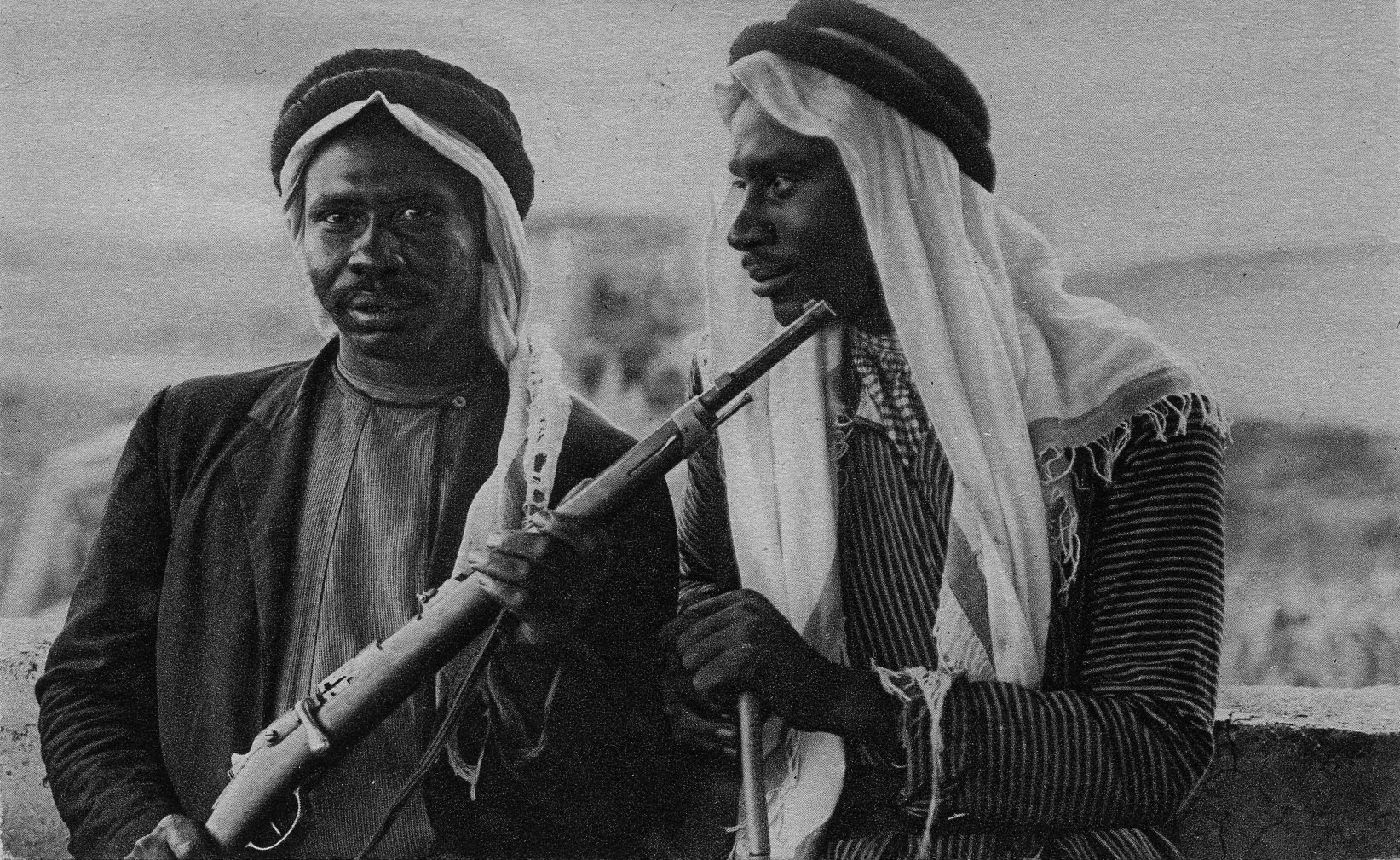The Vital Role of
Afro-Palestinians in the African Diaspora
Small but mighty HISTORY
The African-Palestinian community has survived in the tiny African quarter of Jerusalem and are fiercely proud of their origins and newly-forged identity.
The African-Palestinian community is a small, but rich community situated in the African quarter of Jerusalem, numbering approximately 350 to 450 people. This Afro-Arab community exists in the intersections of African ancestry and Palestinian nationality, under the authority of Israeli forces occupying Jerusalem and other areas of Palestine.
Inside the African-Palestinian community compound. (Sara Hassan / TRTWorld)
The majority of the Afro-Palestinian population lives in a section of Jerusalem referred to as The African Quarter or Little Harlem. However, there are also Afro-descendant communities in Gaza and the West Bank town of Jericho.
The Afro-Palestinian community mainly resides in two neighborhoods, Ribat al Mansuriand and Ribat al-Busari. These neighborhoods are situated between two Israeli checkpoints, through which only residents may pass.
One of these compounds leads into the Al-Aqsa Mosque, considered the third-holiest site in Islam. The process behind which the Afro-Palestinian community came to reside on this holy land is of historical importance. The Afro-descendent community in Jerusalem was granted residency by the Islamci Waqf as recognition for their devotion both to their faith and to the Al-Asqua Mosque.
The Mosque became a site of tension between local Palestinian residents and Israeli forces. In 2021, Israeli security forces descended on the Mosque during Ramadan, and fired rubber-coated bullets at worshippers, throwing tear gas and stun grenades
This resulted in an eleven day siege between Israeli forces and Palestinian militants, approximately 250 people were killed and 2000 were wounded. 70 of the victims were children.
origins of Afro-Palestinians
During the 12th century, African Muslims made regular pilgrimages to the Middle East, including the tenth leader of the Mali Empire, Mansa Musa. Many African Muslims who participated in the Hajj, the annual pilgrimage to Mecca, would visit the Al Aqsa Mosque on their return journey. Over the years, some African pilgrims settled permanently in Palestine, marrying local Palestinian women and having Afro-Arab families. A number of Africans also came to Palestine during the Ottoman Empire.
The neighbourhoods of Ribat al-Mansuri and Ribat al-Busari served as hostels for Muslim pilgrims from 1916 to 1918. During the Arab Revolt of World War I, Ottoman forces converted these compounds into two prisons. These prisons were gruesomely known as ‘The Blood Prison,’ and ‘The Hanging Prison’ where they detained and executed perceived dissidents.
Black people in Gaza constitute a minority of 1% of the total population of two million people inhabitants living in Gaza Strip,
During World War I, the British general, Edmund Allenby led a military campaign against Ottoman forces. This resulted in the British hiring conscripted labourers from Nigeria, Sudan, Senegal and Chad to build railroads and lay pipes in Jerusalem, as part of the British engineering corps. The number of African migrants in Jerusalem grew steadily during the British mandate in Palestine in the 1930s.
In 1948, when conflict occurred between Arab and Zionist forces, this culminated in the state of Israel being founded. Many African Muslims who had traveled to Palestine at that time, ended up settling in the region due to the borders being tightly controlled. Some Africans even joined the Arab Liberation Army and fought on the side of Palestinians to defend the Al-Asqua Mosque as well as their presence in Jerusalem.
Ali Jiddah
notable figures
Ali Jiddah
One of the most notable Afro-Palestinians is Ali Jiddah, a former Palestianian resistance fighter. He is of Chadian descent, and his father is from the Salamat tribe and settled in Palestine after making a pilgrimage there.
Ali Jiddah worked with the organization the Popular Front for the Liberation of Palestine. In response to the Israeli occupation of Jerusalem in 1968, he planted four hand grenades on Strauss Street in Jerusalem which injured nine Israelis. Ali Jiddah was sentenced to 25 years in prison, but was released seven years early in 1985.
Following his release, Jiddah worked as a journalist and tour guide teaching people about life in the area under Israeli occupation. Today he lives in Beit Hanina in East Jerusalem, and has two sons.
Fatima Bernawi
Fatima Bernawi
One of the most notable Afro-Palestinian freedom fighters was Fatima Bernawi. Freedom fighters were Afro-Palestinians and non-Black Palestinians who fought back against an oppressive Israeli regime. Many Afro-Palestinians were routinely subjected to harassment and abuse from Israeli police, randomly having their passports checked or their homes raided.
Born in Jerusalem, Bernawi fled with her mother to a refugee camp near Amman during the 1936 Palestinian rebellion. Bernawi’s father, a migrant from Nigeria, stayed in Jerusalem to take part in the rebellion. It wouldn’t be long before Bernawi followed in her father’s footsteps.
In 1967, Bernawi became the first Palestinian woman to organize a military operation in occupied territory. She was arrested in the attempted bombing of Zion Cinema in West Jerusalem. Bernawi and other Afro-Palestinians were protesting a film showing the 1967 war.
the present
Today, the Afro-Palestinian community is accepted in the wider Palestinian community. That said, in recent years Afro-Palestinians have spoken out about the racist prejudice they’ve been subjected to under Israeli occupation. Many of the Afro-Palestinians who have protested Israeli occupation have found themselves detained, harassed or even imprisoned.
Because the neighbourhoods of Ribat al Mansuri and Ribat al-Busari are situated between two Israeli checkpoints, there’s been heightened security and restricted movement in the African quarter of Jerusalem. This has impacted the African quarter’s local businesses, and puts an already marginalized community in an even more precarious position.
Many Afro-Palestinians remain proud of their African heritage, although because many haven’t visited the continent of Africa with each generation the African influences on the communities’ language, cuisine and customs fades.
There is however a grassroots welfare organization in Jerusalem called the African Community Society. Established in 1983, it is run by Moussa Qous, a Palestinian of Chadian descent. The society works to provide mentoring and support for vulnerable Afro-Palestinian youths. According to Moussa, these workshops provide a safe space for Afro-Palestinian youths who have been disenfranchised by the violence and unrest they are surrounded by due to the occupation.
The spread of COVID-19 and the effects of a global pandemic have reduced how active the African Community Society has been in recent months, though they have participated in distributing free masks and hand-sanitizer in the local area.
The Afro-Palestinian community has a remarkable history. Poised at the intersection of their African ancestry and Palestinian nationality, this Afro-Arab community also lives on contested ground, under the authority of Israeli forces occupying Jerusalem and other areas of Palestine. From pilgrims to resistance fighters, we take a look at the history of the African diaspora in Palestine and what life is like for the community today!
Resource Link:
The history of Afro-Palestinians, Past and Present - This article by Fayida Jailler outlines Afro-Palestinian origins, location or positionality, population, historical events, and notable people as well as an overview of Afro-Palestinians of the present.









